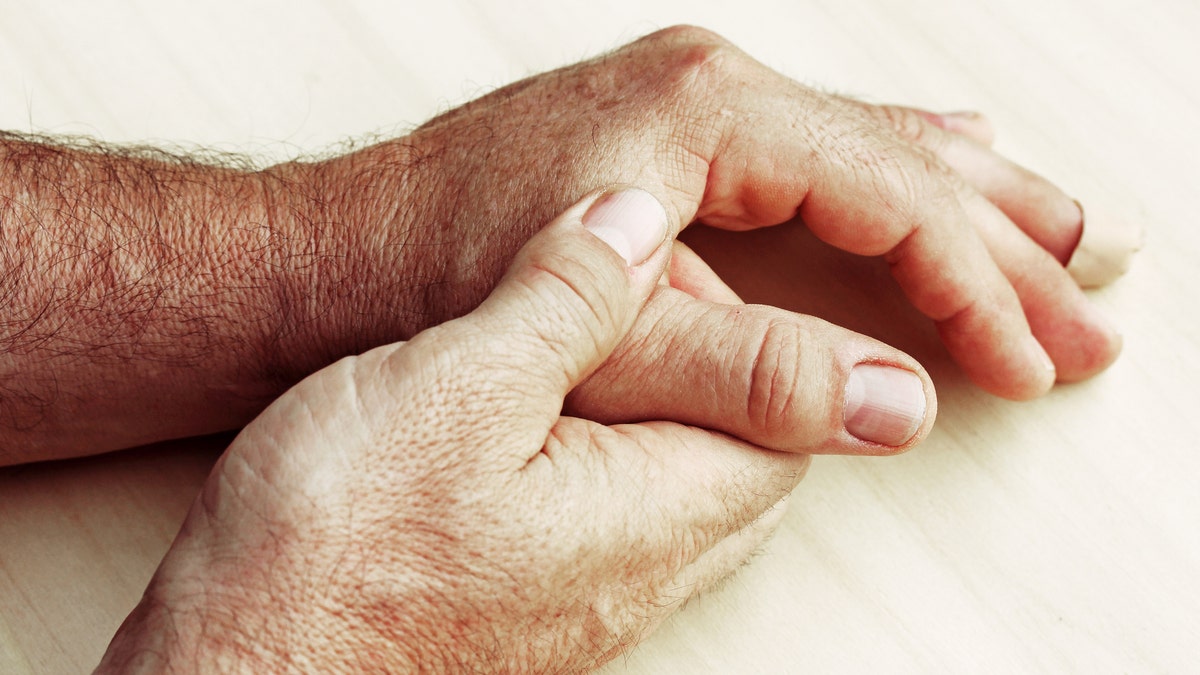
An elderly man has pain in fingers and hands (iStock)
The number of older adults taking at least three prescriptions for psychotropic drugs - which includes opioids, antidepressants, antipsychotics and tranquilizers - has roughly doubled over the past decade, a recent U.S. study suggests.
Nationwide, the number of annual doctor visits involving patients 65 and older who started or were already taking at least three psychotropic drugs surged from 1.5 million in 2004 to 3.68 million in 2013, the study estimated.
"This is not among patients with diagnoses like depression, anxiety, or insomnia, but rather in patients with pain and in patients with no mental health or pain diagnosis," noted lead study author Dr. Donovan Maust of the University of Michigan in Ann Arbor.
"As with other organs, an aging brain may have more difficulty maintaining its 'normal' function," Maust said by email. "As you add additional chemicals that influence the brain, it makes sense that some of these may help the brain, but the more you add, the more they might have negative effects."
These drugs can sometimes help patients with problems like insomnia or chronic pain, but they are often unnecessary. Routinely taking several of these drugs at once can be dangerous and U.S regulators have warned that certain cocktails such as a mix of opioids and antidepressants can be deadly, the study team writes in JAMA Internal Medicine.
To examine how often seniors are taking cocktails of these medicines, researchers examined data on doctor visits for 97,910 patients aged 65 and older between 2004 and 2013.
Overall, the proportion of checkups when seniors got at least three psychotropic medicines prescribed or refilled increased from 0.6 percent of visits to 1.5 percent during the study period.
For rural patients, the proportion of checkups when seniors got at least three of these drugs surged from 0.7 percent of visits to 2.2 percent by the end of the study.
The increase was also steep for patients 85 and older, who got at least three psychotropics at 0.4 percent of visits at the start of the study period and at 1.5 percent of checkups by the end.
Roughly half of the patients taking at least three psychotropics didn't have pain or a mental health condition, and drug cocktails were much more commonly prescribed by family practitioners than by psychiatrists.
One limitation of the study is that researchers lacked data on whether medications were prescribed as needed for short-term use, which the authors note may have led them to overestimate routine use of drug cocktails.
Even so, the findings suggest that patients and families should exercise caution when considering whether to take more than one psychotropic medicine at a time, said Dr. Dilip Jeste, a psychiatry researcher at the University of California, San Diego, who wasn't involved in the study.
"Older adults receiving several medications, and their family members when appropriate, should ask their prescribing physician about why each of those medications is being given," Jeste said by email.
As part of this discussion, they need to tell the physician about all the medications they take as well as over-the-counter remedies such as cough medicines, pain relievers, vitamins and supplements, Jeste added. All of these things, as well as smoking and drinking, can influence the potential for side effects.
Many older adults also have memory difficulties and problems taking medications exactly as prescribed, Jeste added.
"I have seen patients take the less important ones while forgetting the 'must take' medications," Jeste said. "Having a discussion with the physician is critical."







































